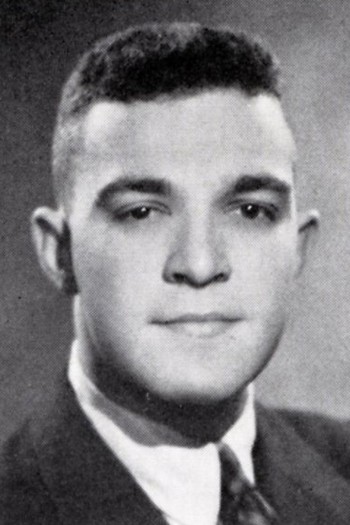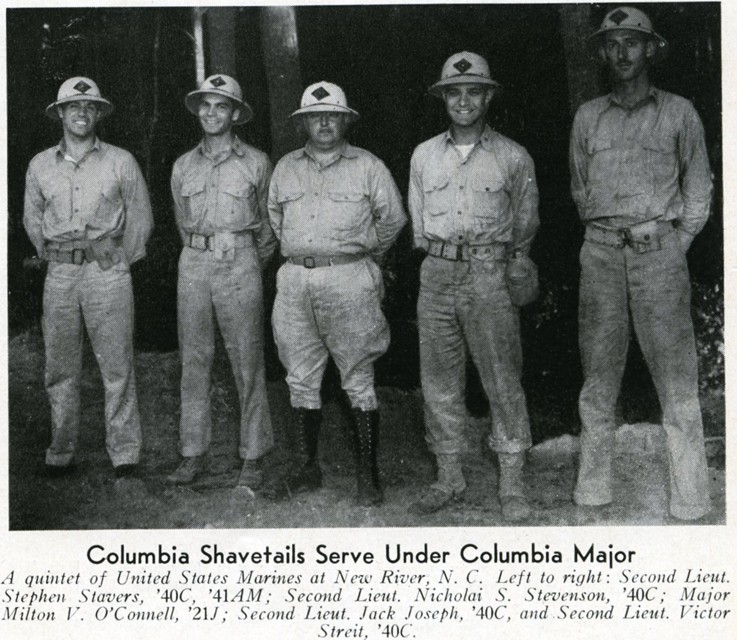Roll of Honor
Home | About | Campus Tour | Help Us
Jacob (Jack) Joseph
- School: Columbia College
- Class Year: 1940
- War: World War II
- Date of Death: October 22, 1942
Captain Jacob Joseph, U.S. Marine Corps, was killed in action at Guadalcanal on October 22, 1942. Two weeks before his death, he wrote to Professor Moore of the Music Department to describe the experiences he had had since leaving the United States on April 13, 1942. He mentioned leaving his classical records behind when he headed to the front line, and that once there, he found the most valuable items to be a "tin of bismuth, a bagful of hand grenades, as well as an even temper."


 Jacob (Jack) Joseph (second from the right) and crew
Jacob (Jack) Joseph (second from the right) and crew
Tributes
Capt. Jacob Joseph Playground Rutgers & Henry Sts Manhattan Acres: 0.14 This playground, bounded by Henry and Rutgers Streets, is named in memory of Captain Jacob Joseph (1920-1942), a member of the U.S. Marine Corps during World War II, and scion of a family devoted to religious education and civic affairs. Born and raised in New York, Joseph left Columbia University as a junior in 1938 to enlist in the Marines. Joseph died in action at Guadalcanal on October 22, 1942. Five years later, a local law named this playground in his honor. The dedication ceremony was attended by Mayor William O’Dwyer, Parks Commissioner Robert Moses, Councilman Stanley Isaacs, and Joseph’s father, City Comptroller, Lazarus Joseph. Parks also unveiled a bronze commemorative plaque on the flagstaff, which celebrates the life and bravery of Capt. Joseph. This playground was built in part to meet the needs of the Rabbi Jacob Joseph School, named after Capt. Joseph’s great-grandfather. Rabbi Jacob Joseph (1840-1902) was the first Chief Rabbi in New York City. Born in Vilna, Poland, he came to the United States at the request of the New York Jewish community. After his death in 1902, Rabbi Joseph’s son, Raphael Joseph, and Samuel I. Andron obtained a charter from the Board of Regents in 1903 to establish the school. The Rabbi Jacob Joseph School was known for its rigorous Tamuldic curriculum and remains open to students from nursery age through the eighth grade. Its founders originally established the school on Manhattan’s Orchard Street but later moved it to Henry Street. In 1976, the school moved to the Graniteville area of Staten Island with separate boys’ and girls’ school This playground, bounded by Henry and Rutgers Streets, is named in memory of Captain Jacob Joseph (1920-1942), a member of the U.S. Marine Corps during World War II, and scion of a family devoted to religious education and civic affairs. Born and raised in New York, Joseph left Columbia University as a junior in 1938 to enlist in the Marines. Joseph died in action at Guadalcanal on October 22, 1942. Five years later, a local law named this playground in his honor. The dedication ceremony was attended by Mayor William O’Dwyer, Parks Commissioner Robert Moses, Councilman Stanley Isaacs, and Joseph’s father, City Comptroller, Lazarus Joseph. Parks also unveiled a bronze commemorative plaque on the flagstaff, which celebrates the life and bravery of Capt. Joseph. This playground was built in part to meet the needs of the Rabbi Jacob Joseph School, named after Capt. Joseph’s great-grandfather. Rabbi Jacob Joseph (1840-1902) was the first Chief Rabbi in New York City. Born in Vilna, Poland, he came to the United States at the request of the New York Jewish community. After his death in 1902, Rabbi Joseph’s son, Raphael Joseph, and Samuel I. Andron obtained a charter from the Board of Regents in 1903 to establish the school. The Rabbi Jacob Joseph School was known for its rigorous Tamuldic curriculum and remains open to students from nursery age through the eighth grade. Its founders originally established the school on Manhattan’s Orchard Street but later moved it to Henry Street. In 1976, the school moved to the Graniteville area of Staten Island with separate boys’ and girls’ school facilities. The city obtained the land that is now the site of this playground in 1930 for easement purposes for the construction of the Independent Subway (IND), now known as the F line. Parks acquired the land by permit from the Board of Transportation in 1934, but did not gain official jurisdiction until 1961. The Board of Estimate transferred the land to Parks to ensure the continuance of the playground. Constructed in a neighborhood with a great need for open space, the playground now provides play space for the children of Chinatown and the Lower East Side. In 1996, Parks completed a $59,000 renovation of this playground. Sponsored by the mayor’s executive budget, this reconstruction included new safety surfacing and colorful modular play equipment. In addition, the new turtle animal art provides a playful aesthetic and a functional climbing structure for the children. This playground serves as a lasting memorial to a World War II hero, as well as to notable members of the Joseph family who have contributed to the surrounding neighborhood and to the larger New York City community.
- Thomas Maher
Captain Joseph was the youngest marine to reach the rank of Captain in the U.S. Marines during World War II. The Captain's father was Lazarus Joseph, a six-time New York State Senator and New York City Comptroller from 1946-1954. Captain Joseph was also the great-grandson of the Chief Rabbi of New York City, Rabbi Jacob Joseph, who was the one of the leading rabbis in the United States during the late nineteenth century. The writer of this tribute is a great grandnephew of the Chief Rabbi Jacob Joseph (for whom Jack Joseph was named). Ira B. Berman North Wales, PA
- IRA B. BERMAN
On August 9th 2012, at Ten Mile River Scout Camp, Narrowsburg, N.Y., there will be a ceremony to commemorate the 70th Anniversary of Captain Joseph's Supreme Sacrifice. Ceremony will take place at the Jewish Chapel, Camp Keowa at 1:00 PM All are encouraged to attend. For information contact Tom Maher, scoutmaster@nyc.rr.com
- Thomas Maher
Is any of our information incorrect? You can submit corrections, additional photos, and/or tributes to uarchives@columbia.edu.
